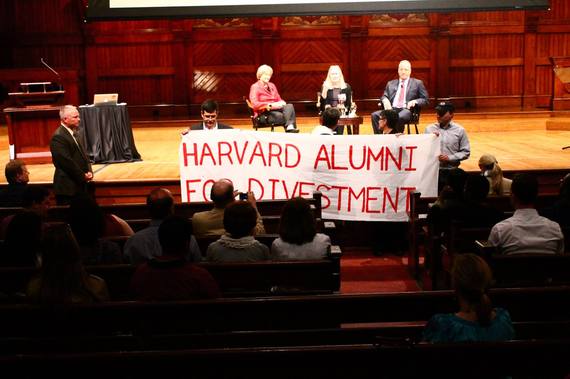I am banned from Harvard University.
I was banned from Harvard University on Friday, May 30th, 2014 after I stood in front of the stage where President Drew Faust was about to speak to an audience of several hundred Harvard alumni. Along with three other (much more distinguished) alumni -- two reverends and a journalist -- I held a banner for approximately two minutes before being whisked away by Harvard police. The banner read "Harvard Alumni For Divestment," and we stood as part of a global movement calling for universities and other institutions to divest their endowments of fossil fuel industry stocks.
I spent four years of my life studying law and policy at Harvard Law School and the John F. Kennedy School of Government at Harvard University. During that time, I decided that the climate crisis was the greatest threat facing humanity, and resolved to do my part to address it, pushing for change on and off-campus. As part of these efforts, I was among four student leaders appointed by President Faust to serve on a university-wide task force to look at how Harvard should address its greenhouse gas emissions. After I graduated in 2010, Harvard awarded me an Irving R. Kaufman Fellowship to jumpstart my public service career. Shortly thereafter, I founded Better Future Project, a Cambridge-based non-profit focused on building the climate justice movement. I have now spent a half-decade since graduation fighting for policies that advance climate justice. Yet, over the course of this time, I have been constantly butting up against the propaganda and opposition of the fossil fuel industry -- propaganda and opposition that Harvard University is betting on, funding and seeking to profit from through its investments.
As a result, my public service career led me back to Harvard last spring when my fellow alumni and I chose to stand in solidarity with the students of Divest Harvard, who are calling on Harvard University to stop investing in -- and profiting from -- an industry that has continually fought tooth and nail against sane energy policies. In return, we were banned from Harvard for all time -- or until we go pleading to Harvard's Chief of Police for "permission" to step foot on our alma mater's campus.
But, I have no plans to stay away: I'm back as part of a weeklong series of events calling on Harvard to divest from fossil fuels -- Harvard Heat Week. Following the leadership of Divest Harvard students, people from all quarters -- alumni, faculty, local community members and others willing to fight for a better future -- will be stepping up and speaking out, calling on Harvard to divest with rallies, panels and vigils. Some of us -- including yours truly -- will be risking arrest as part of a "highly civil" civil disobedience. We do not take this step lightly.
Again and again, Harvard President Drew Faust has chosen confrontation over dialogue. After receiving the backing of over 72 percent of undergraduates and 67 percent of law students in referenda, the student leaders of Divest Harvard pushed for an open forum with the president and were rebuffed. After several months of polite engagement -- and after winning the support of over one hundred Harvard faculty (now well over 200) -- they felt they had no choice but to take nonviolent direct action and blockade the president's office until she agreed to a public dialogue. Rather than agreeing to a dialogue, Faust chose to arrest one of the protesters and press charges (with Harvard later claiming it did not choose to press charges after the judge dismissed them).
But if President Faust and the leaders of the Harvard Corporation think that arrests and bans from campus will stop the divestment movement, they are sorely mistaken. As a historian who came of age in the '60s, President Faust understands and appreciates the heroic sacrifices made by those in that and other struggles. People were literally willing to give their lives for the cause -- and more than a few tragically did.
Enduring threats of bans and arrests require so much less of us today than others were willing to give in past movements, but our cause is no less pressing. We are not merely fighting for Harvard to change its investing practices; we are asking Harvard to align the largest higher education endowment in the world with humanity's best hope for survival -- instead of actively undermining it. This is an all-hands-on-deck scenario, and right now President Faust and Harvard University have their anchor in the water when we need them rowing like crazy toward a just and stable future.
As responsible members of the Harvard community, it is our job to hoist that anchor back and persuade President Faust and the members of the Harvard Corporation to take to the oars. It's not going to be easy -- it will be a heavy lift for sure -- but when the alternative is watching our society self-destruct with Harvard at the helm, well, our historian president must realize that we are not going away. They can ignore us, they can ban us, they can arrest us, they can schedule a week of fluffy climate programming right before we come, but they cannot and will not stop us from coming back, time and again, in larger and larger numbers until we help Harvard choose to proudly stand on the right side of history and divest Harvard from fossil fuels.
Craig S. Altemose is a 2010 graduate of Harvard Law School and Harvard's John F. Kennedy School of Government and the founding Executive Director of Better Future Project, which builds the climate movement in and beyond Massachusetts. He is also a 2010 recipient of the Irving R. Kaufman Fellowship from Harvard Law School.

